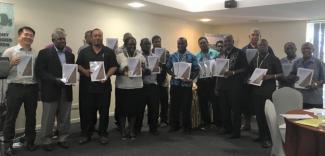
Non-communicable diseases (NCD) account for around 75% of all deaths in the Pacific including the Solomon Islands, creating a ‘human, social and economic crisis’ and representing a hurdle to the healthy island vision and a barrier to achieving sustainable development goals.
To scale up actions to address NCD crisis in the Solomon Islands, the multi-sectoral national NCD strategic plan 2019–2023 was launched by the Minister of Health and Medical Services, Hon Dickson Mua, on 5th September 2019 in Honiara. The Permanent Secretary for Health and Medical Services, Pauline Boseto-McNeil, and Secretary to the Prime Minister, Dr Jimmie Rodgers, were present at the launch event. Permanent Secretaries from other Ministries, senior government officials, representatives from churches, civil societies and development partners including the Pacific Community (SPC) and World Health Organization (WHO) were also in attendance.
Solomon Islands Minister for Health and Medical Services, Hon Dickson Mua, said “the Solomon Islands is at a critical juncture in the NCD response. Success to date are still outstripped by illness, disability, human suffering, and premature deaths from NCD’s.”
“We all have a part to play in the battle to halt and reverse the NCD crisis in this nation. And in reference to the different roles that we will be playing to address the NCD Crisis going forward…I, as the Minister of Health and Medical Services, am very proud to take this time, to launch the Multi – Sectoral National NCD Strategic Plan 2019 – 2023. Together we can beat NCDs.”
This new plan has set out the key multi-sectoral strategies and activities for the next five years to address the substantial burden of NCD and associated risk factors in the Solomon Islands. The statistics for the Island nation are grim with 36.6% identified as current smokers; 66.8% chew betel nut; 31.9% of men and 6.2% of women currently drink alcohol; 87.9% consumed less than five servings of fruit and/or vegetables per day; 59.5% were overweight and/or obese; and 26.7% of the population with hypertension.
The strategic plan is a collaborative effort of the Ministry of Health and Medical Services with technical support from SPC and WHO, and inputs from various Ministries, National University, Global Leadership Youth Nexus and Faith-based Organisations. This bears true testimony to the fact that the hard work of delivering this strategy can only succeed with the involvement of the widest possible coalition.
This plan aligns with the 2016 -2020 Solomon Islands National Health Strategic Plan, recognises the need for a holistic approach to address the NCD and addresses all aspects of the causal pathway for NCD. The plan will serve as an advocacy tool for decision-makers and the government to invest more in the prevention and control of NCD. The plan set out three priority areas to achieve the goal of ‘a long and healthy life for all’. These priorities include:
- Prevent NCD and promote health and wellness for all
- Improve control of NCD through capacity-building and strengthening health systems
- Monitor NCD and evaluate interventions to track progress to achieve set targets
SPC’s Team Leader for Non-Communicable Diseases Prevention and Control Programme, Dr Si Thu Win Tin, explained that, “a comprehensive multi-sectoral approach and collaboration are key to successfully implement the National NCD Strategic Plan. If stakeholders stand together and work together to address NCDs, we can meet the targets set out in the plan and make a significant contribution to the nation’s wellbeing and development.”
Effective prevention necessitates a broad multi-sectoral approach involving different government ministries, civil societies, the private sector, as well as commitment to health and wellness from individuals themselves.
SPC, in collaboration with WHO and other partner agencies, will continue to support the Solomon Islands for the implementation of this five years strategic plan, while developing the longer-term National NCDs Roadmap led by the Prime Minister Office and Ministry of Health and Medical Services that aimed to halt and reverse the NCD Crisis in the Solomon Islands.
